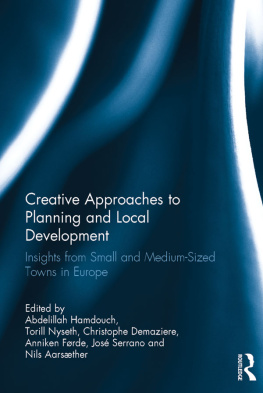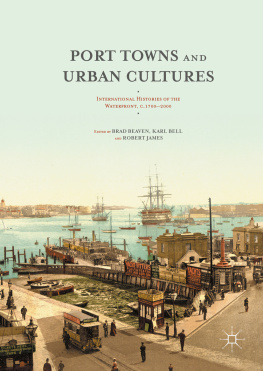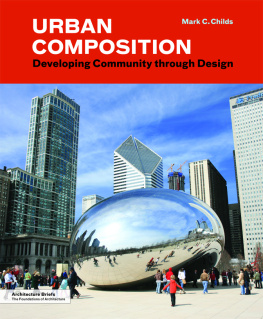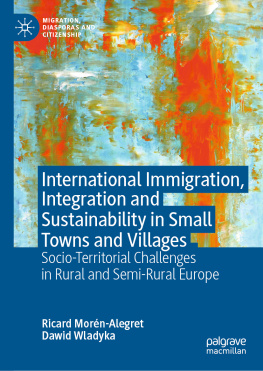Small Towns in Europe in the 20th and 21st Centuries
Heritage and Development Strategies
Lua Kluskov et al.
Published by Charles University
Karolinum Press
www.karolinum.cz
Language supervision by Peter Kirk Jensen
Cover by Jan erch
First English edition
Copyright 2014 by the President and Fellows of Harvard College
Published by arrangement with Harvard University Press
Karolinum Press, 2017
Editorial matter, selection and preface Lua Kluskov, 2017
Remaining chapters Respective authors, 2017
Photography Respective authors
The publication was supported by the Research Framework of Charles University PROGRES Q09 History Key for the Understanding of the Global World.
ISBN 978-80-246-4213-0 (epub)
ISBN 978-80-246-4212-3 (mobi)
ISBN 978-80-246-3656-6 (pdf)
ISBN 978-80-246-3645-0 (print)
Contents
- Preface
Lua Kluskov - Small Towns as a European Cultural Heritage. Introduction
Lua Kluskov and Marie-Vic Ozouf-Marignier - Performing the Past: Identity, Civic Culture and Historical Pageants in Twentieth-Century English Small Towns
Angela Bartie, Linda Fleming, Mark Freeman, Tom Hulme and Paul Readman - The architectural rhythm of a small town is very familiar to us. A Small Town as an Aesthetic Ideal of the Twentieth Century
Martin Horek - Strategies of Manufacturing the Tourist Experience in a Small Town: Local Community and Symbolic Construction in Myshkin
Greg Yudin and Yulia Koloshenko - Urban Cores and Urban Identity: Appropriating and Rejecting a Citys History. The Case of Rethymno
Olga Moatsou - Miraculous Equilibrium. Keys for a Sustainable Network of Small South Iberian Cities
Blanca Del Espino Hidalgo - Concluding remarks
Lua Kluskov and Marie-Vic Ozouf-Marignier
Preface
Lua Kluskov
Our book presents the results of research carried out by scholars of various disciplines (historians, sociologists, architects, and art specialists) and is focussed on the status of contemporary small towns in several European countries. The authors study how town managers and others try to make the best of the not very favourable situation of being a relatively unimportant, peripheral area dependent on a large, influential urban conglomerate. In addition, they examine how architects and planners view the organization of space in a small town.
Small towns, overshadowed by big cities and metropolises, remain a distinct feature of European settlement. While large urban sprawls, with their concomitant suburban malls, highways, skyscrapers, and the like, may seem to lack individuality when compared globally, small towns, on the contrary, retain specific spatial organization, forms of social life, including face to face contact, and engender variety and different regional types.
Which towns qualify as small towns? In scholarly discourse, small towns are classified as those that maintain their traditions and memory, as opposed to large towns where the focus is on the future with, in consequence, a progressive loss of memory. The first are categorized as societies of memory, the second as societies of change. Such an interpretation, however, suggests a rather gloomy prognosis for the future of small towns.
When the co-authors of the book met at a conference of the European Association for Urban History in Lisbon in 2014, they found that their research had a common denominator: an interest in the social function of small towns. The problem of defining what constitutes a small town is touched on only when choosing examples but the point is not laboured. The case studies discuss the interconnection between cultural heritage and its commodification in various situations.
What were the issues that confronted small towns in various parts of Europe in the 20th and 21st centuries? In five chapters the authors present their findings and their selection of illustrative cases. A shared feature in all is a questioning of the role of history and how it is displayed and exploited, at times even manipulated. Indeed, heritage appears to be an underlying characteristic in all the chapters.
A team of British historians, Angela Bartie, Linda Fleming, Mark Freeman, Tom Hulme and Paul Readman, in the chapter entitled Performing the Past: Identity, Civic Culture and Historical Pageants in Twentieth-Century Small Towns, discuss the modifications and changes made to traditional pageants shows depicting historical scenes which used to be very popular in England. The chapter is a revealing and incisive analysis of local patriotism that resonates with the following one on Myshkin, which focusses on the building of a local community through constructing/reconstructing history and the setting up of regular townwide events.
The authors, Greg Yudin and Yulia Koloshenko, both specialists in economic sociology, examine the process of the touristification of a previously not very interesting provincial Russian town, which had no particular historical monuments and, many would say, no real potential for becoming a tourist destination. In their chapter, Strategies of manufacturing tourist experience in a small town, they discuss the success story of Myshkin, where the struggle over town/village status has been crucial for local identity.
The following two chapters, on the other hand, were written by historians of architecture. They deal with regional examples from the southern part of Europe. In Urban Cores and Urban Identity: Appropriating and Rejecting a Citys History, Olga Moatsou looks at small towns in Greece, particularly Rhetymno on the island of Crete. Setting the case study in the context of the national urban network, the author stresses the pertinence of disputes concerning the administrative classification of small towns and their borders in terms of political organization, urban planning and economic development. The Iberian section explores towns in both Andalusia and Alentejo, cross border regions in the southwest of Spain and the south of Portugal. Blanca Del Espino Hidalgo in Miraculous Equilibrium. Keys for a Sustainable Network of Small South Iberian Cities, analyses the strategies adopted by town officials from the perspective of the local network of border regions. Finally, the architectural and urbanistic approach to small towns, from a historical point of view, is introduced by the Czech art historian, Martin Horek: The Architectural Rhythm of a Small Town Is Very Familiar to Us. A Small Town as an Aesthetic Ideal of the Twentieth Century.
The aim of the books authors was to create a multi-faceted collection of studies that would portray different aspects of the contemporary situation of small towns. By means of selected case studies, the notion of the small town is thematized, and its various meanings in different social and geographical settings are assessed. In their research the authors focus on an analysis of the identity of urban communities. This is their first collaboration and followed from the EAUH session proposal on small towns. Their belief that an understanding of small town perspective would make a considerable contribution to the ongoing debate in their respective regions convinced them of the need to research a topic which does not seem so very important, at least at first sight.








